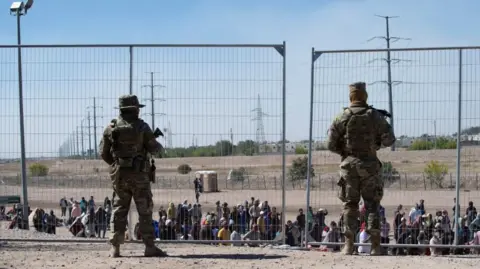|
LISTEN TO THIS THE AFRICANA VOICE ARTICLE NOW
Getting your Trinity Audio player ready...
|
President-elect Donald Trump Monday announced his intention to declare a national emergency on border security and use the military to execute a sweeping deportation of undocumented migrants. The announcement, shared through his social media platform, Truth Social, has already drawn sharp criticism and praise, reflecting the contentious nature of his policies.
Trump, who secured a dramatic return to the White House with a victory over Democratic Vice President Kamala Harris in the November 5 elections, has positioned immigration as the centerpiece of his administration’s early agenda. The former president’s campaign leaned heavily on promises to curb illegal immigration, vowing to deport millions and restore what he called “law and order” at the southern border.
Immigration has been a politically charged issue for decades, but Trump’s rhetoric and proposals have amplified the stakes. During his campaign, he repeatedly described the influx of migrants as an “invasion” and framed undocumented immigrants as threats to public safety.
Trump’s social media post on Monday confirmed his stance. Amplifying a message from a conservative activist, he declared his readiness to implement a mass deportation program using military assets. “True!” Trump added to the repost, signaling his determination to act swiftly.
As part of his preparations, Trump has been assembling a cabinet stacked with immigration hardliners. Among his appointees is Tom Homan, the former acting chief of Immigration and Customs Enforcement (ICE), who has been named “border czar.” Homan, a vocal advocate for strict immigration enforcement, warned undocumented migrants during the Republican National Convention in July: “You better start packing now.”

This hardline approach reflects Trump’s pledge to reverse the policies of the Biden administration, which saw record numbers of migrants crossing the southern border. By December 2023, encounters at the border had peaked at an unprecedented 250,000 in a single month. Though those numbers have since subsided, they remain central to Trump’s argument that the Biden administration failed to secure the border.
The implications of Trump’s proposed deportation plan are vast. Authorities estimate that approximately 11 million people live in the United States without legal status. Critics warn that the plan could affect as many as 20 million families, many of whom include U.S.-born children.
To expedite deportations, Trump has hinted at invoking the Alien Enemies Act of 1798, an archaic law last used during World War II to detain Japanese-Americans in internment camps. Legal experts and human rights advocates argue that the law is outdated and risks undermining due process protections guaranteed by the Constitution.
The United States has long struggled to balance border security with humane immigration policies. Trump’s previous tenure as president saw a similar focus on the southern border, including the controversial family separation policy that drew international condemnation. Yet, his supporters view his hardline stance as a necessary corrective to what they perceive as the Biden administration’s lenient approach.
While Trump’s base has rallied behind his tough rhetoric, his critics have condemned it as fearmongering. During his campaign, Trump repeatedly used inflammatory language, including claims that migrants “poison the blood” of the United States. Such rhetoric, paired with misleading statistics, has fueled widespread debate over the ethics and effectiveness of his proposed policies.
Trump’s return to the White House signals a deepening of divisions in American society over immigration. As he prepares to take office, the battle lines are being drawn between those who view his policies as a necessary step to secure the nation’s borders and those who fear they will lead to human rights violations and undermine America’s values.











LEAVE A COMMENT
You must be logged in to post a comment.